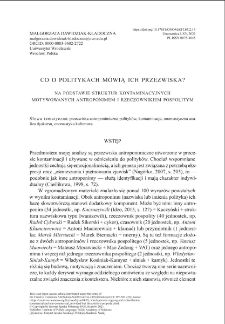
Object
Title: What do nicknames say about politicians? — based on the examples of contamination motivated by an anthroponym and a common noun
Publisher:
Instytut Języka Polskiego Polskiej Akademii Nauk
Place of publishing:
Description:
Abstract:
The article analyzes several dozen anthroponymic nicknames of politicians, which arose as a result of contamination and are motivated by the name of a politician and a common noun. I consider them not as isolated units, but formations within messages which include multimodal texts. The present analysis has been conducted within the framework of discourse onomastics and draws on the methodological tools of cultural linguistics. The examined structures are not so much a reflection of the extra-linguistic reality as an interpretation of the political, economic and social situation in Poland. The aim of the article is to answer the question: What image of Polish politicians is created in anthroponymic nicknames obtained by contamination. The conducted analyses prove that these onyms are the carrier of judgments concerning, for example, the intellect (Donald Półmusk, Paligłup), or the character and disposition (Bucek, Cykorski, Fałszydło) of politicians. Their behavior is sometimes compared to that of animals (Bydłoszewski, Szyszkodnik). Most of the surveyed individuals express emotions related to e.g. the artifacts attributed to politicians (Ryszard Swetru, Vateusz Morawiecki) or the event they became famous for (Andrzej Cuda). Some of the studied names are motivated by more than one anthroponym, e.g. the onym Vateusz Maowiecki was formed as a result of contamination of such units as: Mateusz Morawiecki, Mao Zedong and VAT. The interpretation of this type of units is possible only thanks to the knowledge of the extra-linguistic context and taking into account semiotic codes other than the verbal code.
Relation:
Volume:
Issue:
Start page:
End page:
Detailed Resource Type:
Format:
Resource Identifier:
Source:
Language:
Language of abstract:
Rights:
Terms of use:
Copyright-protected material. May be used within the limits of statutory user freedoms
Access:
Object collections:
- Digital Repository of Scientific Institutes > Partners' collections > Institute of Polish Language PAS > Serials
- Digital Repository of Scientific Institutes > Partners' collections > Institute of Polish Language PAS > Filds of science > Humanities > Linguistics > Onomastics
- Digital Repository of Scientific Institutes > Literature > Journals/Articles
- Digital Repository of Scientific Institutes > Scientific data and objects > Humanities and Social Sciences > IJP PAN files
Last modified:
Feb 10, 2022
In our library since:
Feb 10, 2022
Number of object content downloads / hits:
573
All available object's versions:
https://rcin.org.pl/publication/270845
Show description in RDF format:
Show description in RDFa format:
Show description in OAI-PMH format:
Objects Similar
Dawidziak-Kładoczna, Małgorzata
Batko-Tokarz, Barbara
Jelonek, Tomasz
Kaczyński Łukasz
Brajerska-Mazur, Agata

 INSTYTUT ARCHEOLOGII I ETNOLOGII POLSKIEJ AKADEMII NAUK
INSTYTUT ARCHEOLOGII I ETNOLOGII POLSKIEJ AKADEMII NAUK
 INSTYTUT BADAŃ LITERACKICH POLSKIEJ AKADEMII NAUK
INSTYTUT BADAŃ LITERACKICH POLSKIEJ AKADEMII NAUK
 INSTYTUT BADAWCZY LEŚNICTWA
INSTYTUT BADAWCZY LEŚNICTWA
 INSTYTUT BIOLOGII DOŚWIADCZALNEJ IM. MARCELEGO NENCKIEGO POLSKIEJ AKADEMII NAUK
INSTYTUT BIOLOGII DOŚWIADCZALNEJ IM. MARCELEGO NENCKIEGO POLSKIEJ AKADEMII NAUK
 INSTYTUT BIOLOGII SSAKÓW POLSKIEJ AKADEMII NAUK
INSTYTUT BIOLOGII SSAKÓW POLSKIEJ AKADEMII NAUK
 INSTYTUT CHEMII FIZYCZNEJ PAN
INSTYTUT CHEMII FIZYCZNEJ PAN
 INSTYTUT CHEMII ORGANICZNEJ PAN
INSTYTUT CHEMII ORGANICZNEJ PAN
 INSTYTUT FILOZOFII I SOCJOLOGII PAN
INSTYTUT FILOZOFII I SOCJOLOGII PAN
 INSTYTUT GEOGRAFII I PRZESTRZENNEGO ZAGOSPODAROWANIA PAN
INSTYTUT GEOGRAFII I PRZESTRZENNEGO ZAGOSPODAROWANIA PAN
 INSTYTUT HISTORII im. TADEUSZA MANTEUFFLA POLSKIEJ AKADEMII NAUK
INSTYTUT HISTORII im. TADEUSZA MANTEUFFLA POLSKIEJ AKADEMII NAUK
 INSTYTUT JĘZYKA POLSKIEGO POLSKIEJ AKADEMII NAUK
INSTYTUT JĘZYKA POLSKIEGO POLSKIEJ AKADEMII NAUK
 INSTYTUT MATEMATYCZNY PAN
INSTYTUT MATEMATYCZNY PAN
 INSTYTUT MEDYCYNY DOŚWIADCZALNEJ I KLINICZNEJ IM.MIROSŁAWA MOSSAKOWSKIEGO POLSKIEJ AKADEMII NAUK
INSTYTUT MEDYCYNY DOŚWIADCZALNEJ I KLINICZNEJ IM.MIROSŁAWA MOSSAKOWSKIEGO POLSKIEJ AKADEMII NAUK
 INSTYTUT PODSTAWOWYCH PROBLEMÓW TECHNIKI PAN
INSTYTUT PODSTAWOWYCH PROBLEMÓW TECHNIKI PAN
 INSTYTUT SLAWISTYKI PAN
INSTYTUT SLAWISTYKI PAN
 SIEĆ BADAWCZA ŁUKASIEWICZ - INSTYTUT TECHNOLOGII MATERIAŁÓW ELEKTRONICZNYCH
SIEĆ BADAWCZA ŁUKASIEWICZ - INSTYTUT TECHNOLOGII MATERIAŁÓW ELEKTRONICZNYCH
 MUZEUM I INSTYTUT ZOOLOGII POLSKIEJ AKADEMII NAUK
MUZEUM I INSTYTUT ZOOLOGII POLSKIEJ AKADEMII NAUK
 INSTYTUT BADAŃ SYSTEMOWYCH PAN
INSTYTUT BADAŃ SYSTEMOWYCH PAN
 INSTYTUT BOTANIKI IM. WŁADYSŁAWA SZAFERA POLSKIEJ AKADEMII NAUK
INSTYTUT BOTANIKI IM. WŁADYSŁAWA SZAFERA POLSKIEJ AKADEMII NAUK


































